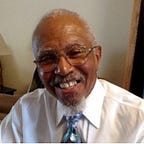Spirituality: Cornerstone of African American Education
Preface
I originally wrote this book in 2015. Since that time I have discussed its content with other people of faith and began to realize that the absence of spirituality was affecting not only education but every aspect of community life. Our lives are built upon learning; first from our parents and then from our community, religious institutions and mass media. Finally we learn in a formal school setting. So the infusion of spiritual education must necessarily permeate every aspect of our lives.
I believe that the absence of God-Consciousness is destroying our country. Disregard for an Almighty has lead to greed and self-interest on the Right and excessively loose moral values on the Left. In this book I am focusing on African Americans and I have observed that this subculture is not immune to the effects secularism and it has resulted in the destruction of African American families, culture, political awareness and educational advancement. Therefore I have decided to expand this volume and provide the reader with examples germain to the environment in which we live.
The point of departure of this study is an investigation into the social practices of pre-colonial African people. Specific emphasis is placed on the importance of spirituality, be it Christianity, Islam, or tribal religion in the development and internalization of social responsibilities and moral values within a community. In fact, my research indicates that belief in a Supreme Being is the foundation upon which all community life was built. Societal norms and moral values were grounded in spirituality. To offend one’s family or community was viewed an offense to one’s Creator.
When transported to the West, the Africans needed faith in a deity more powerful than the slave holder in their immediate circumstances. The African was stripped of his family and community connections yet he held his strong belief — his life was in the hands of his owner but his soul was free and under the protection of an Almighty Creator completely independent of his master. The slave masters had control of their physical bodies but their minds and spirits were focused on an Almighty who would intercede eventually on their behalf against their oppressors.
Black people were beaten, raped; their bodies mutilated and even murdered for the single purpose of keeping them submissive to the will of the white slave master. Slave labor was big business and the system could not survive if the human chatel were treated humanely. Greed prevented humane treatment. To survive these inhumane conditions the African had to cling to a power greater than that of his oppressor. This was the source of his strength of faith.
In today’s climate of education, political and economic manipulation which continues to deny many Blacks full and just participation in our society, faith in a power greater than any possed by influential people still provides the African-American an anchor for long term stability. Even today there are examples of oppression by powerful people. This year alone there have been far too many incidents of white police officers shooting unarmed people of color and going unpunished by our Justice system. Faith in a power greater than the power brokers in our society is still needed but, unfortunately, too many of our young adults are turning away from their strong belief and faith in The Almighty.
With the Emancipation Proclamation came the opportunity to rekindle their societal strength through a spiritual focus; one in which the former slaves, to the extent possible, established family life and social responsibility for their lot. But this characteristic seemed to dissolve with a new value structure predicated upon individualism. Partly fueled by ideologies such as Secular Humanism, African Americans began to replace their faith in The Almighty with belief in their own abilities — a concept foreign to their African ancestors.
Social and economic segregation in America prohibited most African-Americans from gaining political or economic prominence. Subsequently, for them, using a value system based upon individual worth was never to be realized and the power to influence meaningful societal changes was denied them. Through the manipulation of education resources, disenfranchisement, and limited access to economic support, people of color, with few exceptions, remained pawns at the hands of greedy individuals. The strength of faith that enabled them to progress cooperatively has been replaced with a sense of individualism alien to both ancestors and at odds with their collective interest.
With the promise of meritocracy beyond the reach of most African Americans and a steadily increasing loss of their faith in the Almighty, many today find themselves wandering in a quagmire. On a personal level, they frequently abuse themselves, and disrespect traditional social institutions.
In this book I argue that the solution for African-Americans lay in their ability to rekindle the spiritual dimension of their being and to recapture societal norms and values predicated upon what is pleasing to The Almighty. In so doing they should become independent in their thinking, goals and aspirations. Their collective condition will improve and they can become prolific contributors to our American society.
This book is available from amazon.com.
